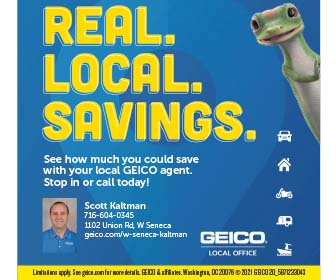(Welcome to the weekly pet column of Pet Connection Programs Inc. of Marilla, N.Y. A new article is posted each week, so be sure to check back on a regular basis!)
A 2018 survey conducted by Banfield Pet Hospital revealed 91 percent of pet owners are not prepared for the next natural disaster. In advance of hurricane season, and in honor of FEMA’s National Animal Disaster Preparedness Day, the Banfield Foundation, a nonprofit dedicated to serving pets and the people who love them, kicked off a disaster preparedness campaign to help pet owners prepare for the unexpected, yet inevitable.
Through Sept. 30, for every donation of $45 or more made at BanfieldFoundation.org/kit, the Banfield Foundation will thank donors with a pre-assembled pet disaster preparedness kit — and donate a kit to vulnerable pet owners in select high-risk states, up to 1,000 kits. The kits include a waterproof bag containing critical supplies such as a blanket, treats, stress-relief products, water and food calculation charts, tips and checklists to help keep pets cared for in the event of a natural disaster. All donations will support the Banfield Foundation’s Disaster Relief Grant program, which aids nonprofit animal organizations and local communities impacted by natural disasters.
“People and pets face emergent rescue and recovery needs during and after disasters, so being prepared is an unfortunate but imperative reality of today’s world,” said Kim Van Syoc, executive director of the Banfield Foundation. “Those with a comprehensive plan in place that includes every member of their family – including their pets – may encounter fewer challenges in the event of an emergency. We’re committed to helping pet owners get ahead of disasters, so they have the best possible chance of keeping their family together, regardless of their circumstance.”
In 2017, the Banfield Foundation provided a Disaster Relief Grant to Texas A&M University’s Veterinary Emergency Team (VET) to unveil the university’s first custom, fully equipped veterinary medical unit. As the largest and most deployed veterinary emergency response unit in the country, Texas A&M’s VET is a leader in emergency preparedness education. The 25-foot truck, which can be deployed anywhere in the U.S., expanded the Texas A&M VET’s medical-response capability in times of disaster.
To help educate pet owners and raise awareness of the importance of disaster preparedness, the foundation has partnered with Texas A&M’s VET to share tips on how to prepare for the unexpected:
• Create a pet disaster preparedness kit that includes basic survival needs like three to seven days of food and water and two weeks’ worth of medications. Partner with your veterinarian to talk about emergency planning and discuss what to include in a kit for your pet based on their specific needs, such as important documents like medical and vaccination records, microchip and provider information, as well as photos of you with your pet in case of separation.
• In the event of a natural disaster, never leave your pets behind—in vehicles, tethered or crated without you or a member of your family. To help avoid having to make such a choice, identify and create a list of places to evacuate with your pets in preparation, such as pet-friendly hotels or boarding facilities, and include contact information and addresses for each. Also include contact information for your veterinarian, as well as emergency veterinarians in nearby cities in your kit.
• Ensure your pets are microchipped. Banfield also found more than half of those surveyed do not have their pet microchipped. In addition to ensuring your pet is always wearing up-to-date identification tags, talk with your veterinarian about microchipping your pets – and ensure your account and contact information is kept current – to increase the likelihood of a reunion if your pet gets loose amidst chaos.
“We know all too well that disaster can strike anywhere, anytime — and last year alone, numerous families and pets were affected by hurricanes, wildfires and flooding,” said Dr. Wesley Bissett, founder and director of Texas A&M University’s Veterinary Emergency Team. “Historically, animals have been ignored during disasters, but they deserve our help. Coupled with the impact that saving a pet has on someone who may have lost everything else — that’s indescribable. If we can help just one pet owner be better prepared, then we’ve made a measurable difference.”
For more information or to donate to the Banfield Foundation, visit www.BanfieldFoundation.org/kit.
— PRNewsire
(For more information on pets and animal adoption, please visit www.petconnectionprogramsinc.com. Or, visit their Facebook page at www.facebook.com/PetConnectionProgramsinc. Located in Marilla, N.Y., Pet Connection Programs Inc. is a nonprofit maternity and special care shelter founded in 1984.)




